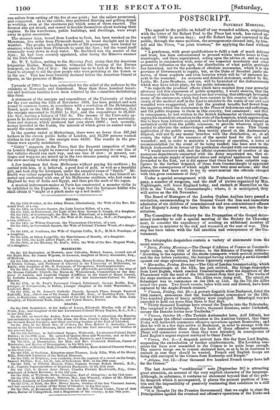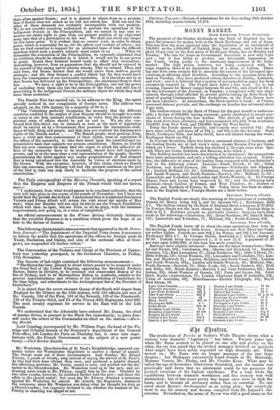The telegraphic despatches contain a variety of statements' from the
usual sources. - .
" Faris, Friday Morning.—The Charge d'Affaires of France at Constanti- nople writes, on the 10th of October, to the Minister of Foreign Affilirs- According to the captains of the steam-transports -which arrived yesterday and the day before yesterday, the besieged having attempted a sortie directed against our siege operations, had been elfleFouslY fel-m.404: "Marseilles, Friday-.Evening.—Tlio City of London transport-ship,- -Which left Constantinople on the 13th, has juet arrived, She brings despatchea from Lord Raglan, which reached Constantinople after the departure of the Pharamond with the mail of the 10th instant!from that port. The worka:of the siege continue to advance.. The-Allies-were doing well. The attrack.en Sebastopol was to-commence on the- 10th...cm 11th. On the 7th the Allies seized two guns. Two Greek vessels, laden with corn and linseed, have been
captered by the Anglo-French cruisers.". . .
" Vienna, .Friday, Oct. -20.—Apricots despatch from Bncharest, dated the 16th instant, -announces that the bomharslment commenced on the 13th. Two hundred pieces of heavy artillery viers" einpleyed. Sebastopol was not expected to hold out more than three or four. claye. "Thirty thousand Russians have crossed the Danube into the Dobrutscha. The vanguard is at Babadagh. Twelve thousand Russians, under Uschakoff,
occupy the Danube ferries near Toultsche." ' • . -
"Vienna, October 16.—The Turkish Ambassador here, Arif. Effendi, has already made the Official communication to the Austrian Cabinet, that Omar Pasha will forthwith commence offensive operations against Bessarabia ; and that he will in a few days arrive -at Bucharest, in order to arrange with the Austrian commander there about the_ basis of those offensive operations. These will commence sooner than they were intended, in consequence , of Lord Raglan's urgent request conveyed to Omar Pasha."
" Varna' Oct. 6.—A despatch arrived here this day from Lord Raglan, suspending the embarkation of further reinforcements. His Lordship con- siders the force now assembled in the Crimea to be quite large enough. The reserve troops are to remain stationed here, so as to be in readiness to embark in case they should be wanted. French and English troops are being still conveyed to the Crimea from Kustendje and Burgas."
"Athens, Oct. 12.—Four thousand five hundred French troops have left for the Crimea."
The last Austrian "confidential" note [September 30] is attracting great attention, on account of the very explicit character of the language. Although, in substance, it contains no statement beyond that of the pub- lic despatch which it accompanied, it places the present position of Aus- tria and the impossibility of passively continuing that condition in a still clearer light. "It is thought [by the Prussian Government] that we ought to close the Principalities against the eventual and offensive operations of the Turks and
their allies against Russia ; and it is desired to obtain from us a promise that if Russia does not attack us we will not attack her. Both one and the other of these demands are evidently incompatible with our position. We do not consider ourselves authorized to prevent the operations of the belligerent Powers in the Principalities, and we cannot in any case re- nounce our entire right to pass from our present position of an expectant army into that of a participator in the war. We shall not dwell any longer on this latter point. It is evident that we cannot wait, in order to obtain peace, which is a necessity for us, for the efforts and combats of others ; nor can we bind ourselves to support for an unlimited lapse of time the difficult
sacrifices which such a passive attitude must entail on us When we demanded the evacuation of the Principalities, we expressly stipulated that no condition should be attached to it which it would not be in our power to grant. Russia then declared herself ready to effect that evacuation ; demanding, however, from us guarantees that she should not be exposed to the pursuit of the enemy and to ulterior attacks. This we refused. Then, and only then, did Russia declare that she would retire from motives purely strategic ; and she thus foresaw a conflict which but for that would have been the consequence of our irrevocable resolution. It is therefore not to us that Russia has delivered up the Principalities; she abandoned them to their fate. . • . . We have a right to be in the Principalities, but not the power of excluding from them any but the enemies of the Porte, and still less of prescribing to the belligerent Powers the military object for which they shall enter those countries."



























 Previous page
Previous page